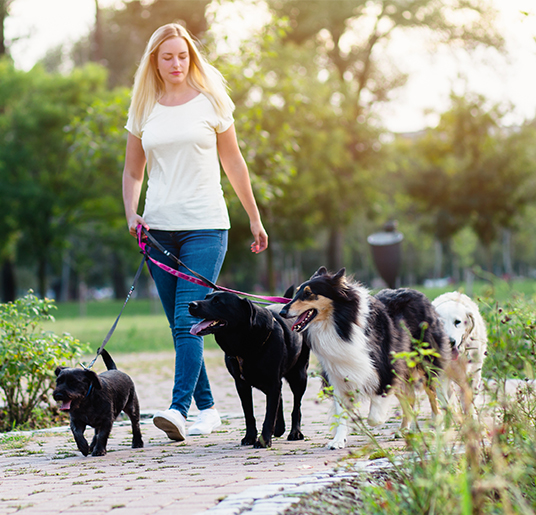
There are many laws that apply to people who own or are in charge of a dog. These laws exist to protect people, other animals, the environment and public health. The Council enforces these laws, which include those relating to:
- Stray dogs
- Dog collars
- Microchipping of dogs
- Public Spaces Protection Order:
- Removing dog fouling
- Carrying dog fouling bags
- Dogs to be kept on leads on or near a highway and when directed by a Council or Police officer
- Exclusion of dogs from play areas and similar places
- Limiting the number of dogs that a person can be in charge of to six
Contact Environmental Health
Telephone 01543 462621 or email environmentalhealth@cannockchasedc.gov.uk.
- Stray Dogs
-
A stray dog is a dog that is in a public place or on private land without the permission of the owner or occupier, and not accompanied by its owner or the person in charge of the dog. The law relating to stray dogs in contained in the Environmental Protection Act 1990.
Dog Warden
To protect the dog, other animals, the public and the environment the Council Dog Warden will seize stray dogs. The Dog Warden will check the dogs collar and microchip and attempt to return the dog to its owner. If this is not possible, the dog will be taken to the Council's kennels. It will be kept there for seven days so that the owner can claim the dog. After the seven days, the Council will make the dog available for rehoming.
Finding a Stray Dog
If you find a stray dog, you must either return the dog to its owner or contact the Council and hand the dog over to the Dog Warden.
Lost Dogs
If you have lost your dog within the District, contact the Council and we can check whether the Dog Warden has seized it.
- Dog Collars
-
The Control of Dogs Order 1992 requires that any dog in a highway or public place must wear a collar with the details of the owner attached to it. The owner or person in charge of the dog can be prosecuted if the dog is not wearing a collar and the maximum penalty upon summary conviction is six months imprisonment and an unlimited fine. Any dog not wearing a collar may also be seized by the Dog Warden and treated as a stray dog.
- Public Spaces Protection Order (PSPO)
-
The Council seeks to reduce ant-social dog ownership through the Public Spaces Protection (Dog Control) (Cannock Chase District) Order 2022.
The Order imposes various requirements on dog owners and those in charge of a dog in public places:
- To remove dog faeces when the dog fouls
- To carry a bag or other suitable receptacle for removing dog faeces and to show it when requested to by a Council or Police officer
- To exclude dogs from children’s play areas, tennis courts and multi-use games areas
- To keep dogs on leads when in or near a road and to put a dog on a lead when directed to by a Council or Police officer
- To be responsible for no more than six dogs at a time
The maximum penalty upon summary conviction for failing to comply with the PSPO is £1,000. Alternatively a Council officer may issues a fixed penalty notice.
PSPO - Dog Control .pdf (222.26 KB)
- Microchipping of Dogs
-
The Microchipping of Dogs (England) Regulations 2015 requires that all dogs older than eight weeks must be implanted with a microchip and that the microchip must be registered to a database containing the details of the owner. Failing to have a dog microchipped when required to do so is a criminal offence, as is failing to update the microchip details on becoming the owner of a dog, and the maximum penalty upon summary conviction is £500. Council officers may also take possession of a dog in order to implant a microchip and recover the costs in doing so from the owner. More information can be found here.
